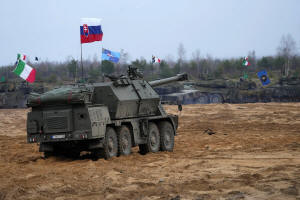Explainer-NATO's Articles 4 and 5: Could Ukraine war trigger its defence
obligations?
 Send a link to a friend
Send a link to a friend
 [November 16, 2022]
By Matt Spetalnick [November 16, 2022]
By Matt Spetalnick
WASHINGTON (Reuters) - NATO ambassadors
held an emergency meeting on Wednesday after a missile strike killed two
people in Poland and raised global alarm that Russia's war in Ukraine
could spill into neighboring countries.
WHAT HAPPENED
NATO said an investigation was still underway but the explosion at a
grain facility in NATO-member Poland near the Ukrainian border was
likely caused by a Ukrainian air defence missile, and there was no
indication of a deliberate attack or that Russia was preparing military
actions against its allies.
NATO Secretary-General Jens Stoltenberg said in Brussels that the attack
was not Ukraine's fault and Russia bore ultimate responsibility as it
pursued its war against Ukraine.
Polish Prime Minister Mateusz Morawiecki said Poland was still analyzing
the possibility of launching an Article 4 procedure -- a formal call for
consultations among members of the alliance in the face of a security
threat -- but added that it seemed it may not be necessary.

WHAT IS ARTICLE 4?
Article 4 states NATO members will consult together whenever, in the
opinion of any of them, the territory, political independence or
security of any of them is threatened.
Under Article 4, discussions at the North Atlantic Council -- NATO’s
principal political decision-making body -- could potentially lead to
some form of joint decision or action.
Since NATO’s creation in 1949, Article 4 has been invoked seven times,
most recently in Feb. 2022 when eight members sought consultations
following Russia's invasion of Ukraine.
WHAT IS ARTICLE 5?
If Russia were determined to have attacked the territory of a member
state, the focus would then shift to Article 5, the cornerstone of the
founding treaty of NATO.
The alliance was created in 1949 with the U.S. military as its powerful
mainstay essentially to counter the Soviet Union and its Eastern bloc
satellites during the Cold War.
The charter stipulates that "the Parties agree that an armed attack
against one or more of them in Europe or North America shall be
considered an attack against them all."
"They agree that, if such an armed attack occurs, each of them, in
exercise of the right of individual or collective self-defense
recognized by Article 51 of the Charter of the United Nations, will
assist the Party or Parties so attacked by taking forthwith,
individually and in concert with the other Parties, such action as it
deems necessary, including the use of armed force, to restore and
maintain the security of the North Atlantic area," it says.
[to top of second column]
|

Zuzana 155 mm gun howitzer of NATO
Enhanced Forward Presence battle group takes position before live
fire exercise, during Iron Spear 2022 military drill in Adazi,
Latvia November 15, 2022. REUTERS/Ints Kalnins

HOW COULD THE UKRAINE WAR TRIGGER ARTICLE 5?
Since Ukraine is not part of NATO, Russia's invasion in February did
not trigger Article 5, though the United States and other member
states rushed to provide military and diplomatic assistance to Kyiv.
However, experts have long warned of the potential for a spillover
to neighboring countries on NATO's eastern flank that could force
the alliance to respond militarily.
Such action by Russia, either intentional or accidental, has raised
the risk of widening the war by drawing other countries directly
into the conflict.
IS INVOKING ARTICLE 5 AUTOMATIC?
No. Following an attack on a member state, the others come together
to determine whether they agree to regard it as an Article 5
situation.
There is no time limit on how long such consultations could take,
and experts say the language is flexible enough to allow each member
to decide how far to go in responding to armed aggression against
another.
Article 5 has been activated once before – on behalf of the United
States, in response to the Sept. 11, 2001, hijacked-plane attacks on
New York and Washington.
WHAT HAS BIDEN SAID ABOUT ARTICLE 5 COMMITMENTS?
While insisting that the United States has no interest in going to
war against Russia, President Joe Biden has said from the start of
Moscow's invasion that Washington would meet its Article 5
commitments to defend NATO partners.
"America's fully prepared with our NATO allies to defend every
single inch of NATO territory. Every single inch," Biden said at the
White House in September.
He had declared earlier that there was "no doubt" that his
administration would uphold Article 5.
(Reporting by Matt Spetalnick; Editing by Kieran Murray, Grant
McCool and Bradley Perrett, William Maclean)
[© 2022 Thomson Reuters. All rights
reserved.]
This material may not be published,
broadcast, rewritten or redistributed.
Thompson Reuters is solely responsible for this content.
 |